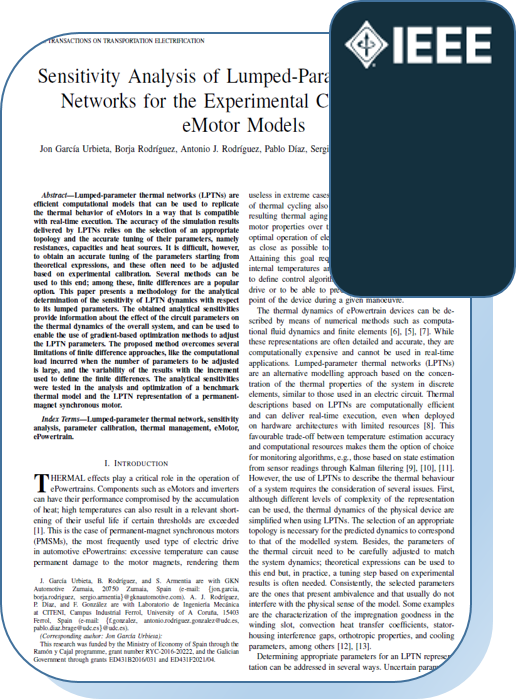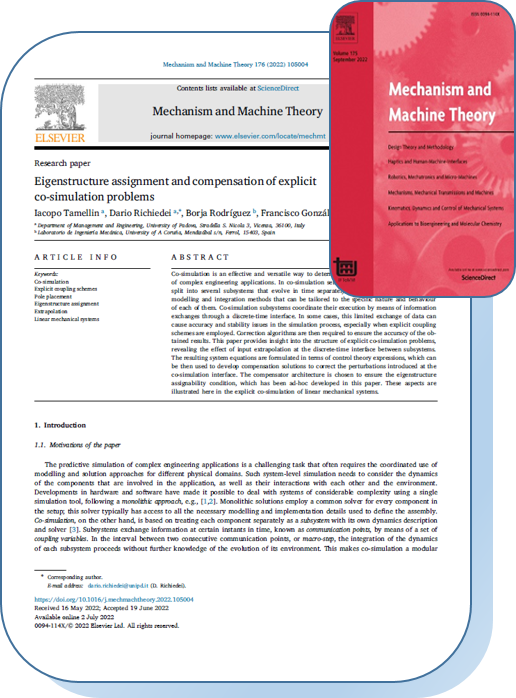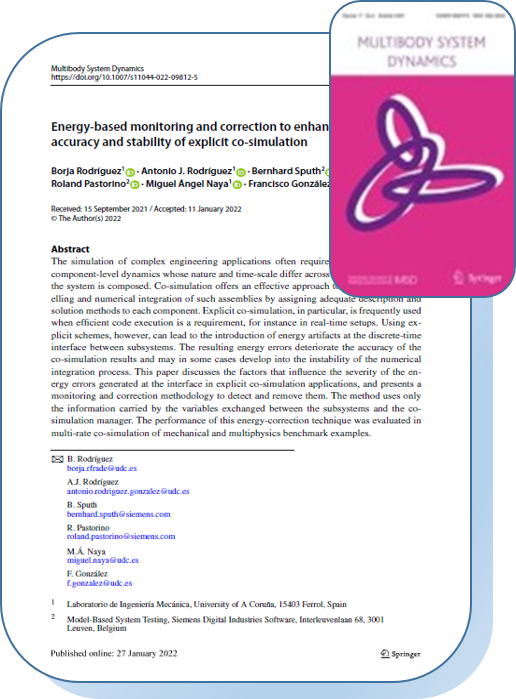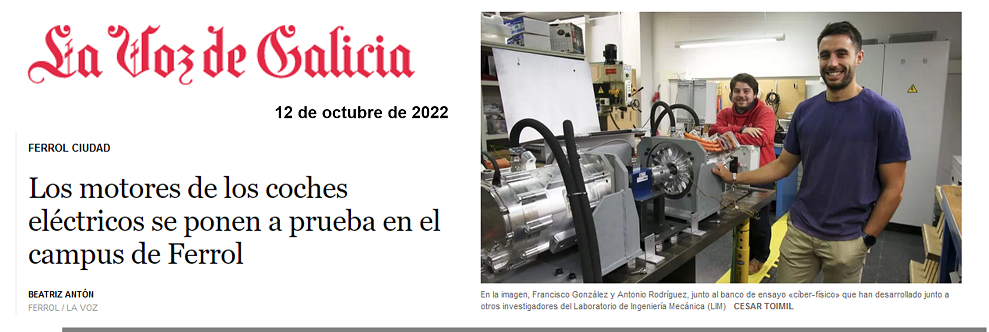G-TWIMBAUTO: Digital Twins of Electric Motors for Cyber-Physical Test Benches
G-TWIMBAUTO explores the introduction of the digital twin paradigm in cyber-physical test benches for automotive and industrial applications. The theoretical developments in this project are validated by means of numerical simulation and experiments in test benches for electric motors, in which the components under test are interfaced to virtual environments following a Model-Based System Testing approach.
The project started in 2021 at the Mechanical Engineering Laboratory (Laboratorio de Ingeniería Mecánica - LIM) of University of A Coruña (Spain). Researchers from Siemens Digital Industries Software (Belgium) and GKN Automotive Zumaia (Spain) have collaborated in its tasks.

Contact information
Laboratorio de Ingeniería MecánicaEscuela Politécnica Superior
Mendizábal s/n, 15403 Ferrol - Spain
f.gonzalez@udc.es
Publications
The following journal articles are the result of the research conducted in this project.
|
|
|
The project results have also been presented in international conferences:
- Efficient Consideration of Thermal Ageing in Digital Twins of Automotive-Grade Electric Motors
J. García-Urbieta, U. Linazasoro, P. Díaz, I. García, A. García, S. Armentia, A.J. Rodríguez, F. González.
26th International Conference on Electrical Machines (ICEM), Torino, Italy, Sep. 2024. - Efficient Calibration of LPTN Models for Digital Twins of ePowertrain Motors
J. García Urbieta, I. García, P. Díaz, S. Armentia, A. J. Rodríguez, F. González.
Electric Drives Production Conference (EDPC) 2023, Regensburg, Germany, Nov. 2023. - Identification and Update of Thermal Models in Digital Twins of ePowertrain Motors
J. García Urbieta, I. García, M. Marijuán, S. Armentia, P. Díaz, A. J. Rodríguez, F. González.
32nd Aachen Colloquium Sustainable Mobility, EDU Concept Development I.1, Aachen, Germany, Oct. 2023. -
Experimental Study of the Effect of Co-Simulation Schemes on Cyber-Physical Testing
A. J. Rodríguez, E. Vázquez, C. Lourido, P. Díaz, E. Sanjurjo, U. Lugrís, F. González.
ECCOMAS Thematic Conference on Multibody Dynamics, paper 93, book of abstracts, p. 155. Lisbon, Portugal, Jul. 2023. - Multibody System Dynamics Simulation for Automotive Cyber-Physical Test Benches
J. García-Urbieta, D. J. Palomar, M. Marijuan, B. Rodríguez, F. González.
The 6th Joint International Conference on Multibody System Dynamics - IMSD 2022, New Delhi, India, Oct. 2022. - Methods for the Real-Time and Hybrid Co-Simulation of Multibody System Dynamics Applications
F. González, A. J. Rodríguez, B. Rodríguez, J. García-Urbieta.
Symposium on High Performance Multibody System Simulation, Innsbruck, Austria, Oct. 2022. - Development of a Cyber-Physical Test Bench for E-Powertrain Components
B. Rodriguez, A. J. Rodríguez, D. Maceira, F. Bottero, E. Sanjurjo, U. Lugrís, M.Á. Naya, F. Gonzalez, J. Cuadrado.
ECCOMAS Thematic Conference on Multibody Dynamics, paper EDU-3, book of abstracts, pp. 102-103. Online Event, Dec. 2021. - Cyber-Physical Test Benches for Model-Based System Testing of Electric Motors
B. Rodriguez, A. J. Rodríguez, D. Maceira, E. Sanjurjo, U. Lugrís, M.Á. Naya, F. Gonzalez, J. Cuadrado.
1st International Conference on Machine Design - MD 2021, Porto, Portugal, Sep. 2021.
The project development has led to the completion of the following student graduation projects in the Engineering School of Ferrol (EPEF):
- Evaluación de Resultados en Bancos de Ensayos Ciber-Físicos para Motores Eléctricos (In Spanish) C. Lourido, Master's degree in Mechanical Engineering, Universidade da Coruña, Sep. 2023.
- Diseño de una Solución de Sensorización para un Banco de Ensayos de Motores Eléctricos (In Spanish) E. Vázquez, Degree in Mechanical Engineering, Universidade da Coruña, Jul. 2023.
In the Media
|
Related Projects
G-TWIMBAUTO builds upon the expertise acquired in other projects previously developed at LIM:
- The HiPERFORM project (2018-2021), funded by the European Union, dealt with the development of efficient Wide Band Gap (WBG) components for their use in electronic devices. In this project, researchers at LIM used effective co-simulation algorithms and thermal models of e-powertrain componens to test the performance of electric vehicles that use this new technology. |
|
- COSIMBAUTO (2018-2021), funded by the Ministry of Economy of Spain, investigated co-simulation schemes suitable for soft- and hard-real-time simulation of multiphysics systems in Hardware/Human-in-the-Loop (HiL) and System-in-the-Loop (SiTL) test benches, with special focus on automotive applications. |







